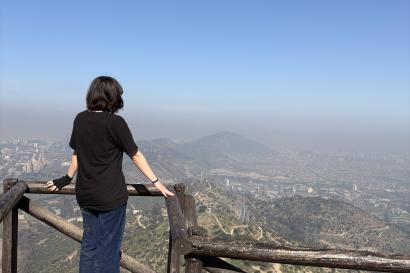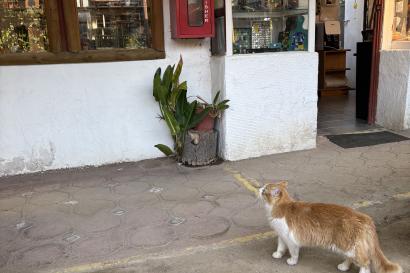Before we ended our program, we had a presentation about re-entry to our home country. We learned about the different emotions we could feel and how we could have a reverse culture shock. I honestly didn't think that I would have a really hard time with that since throughout my study abroad, I was feeling a bit of homesickness here and there. To be honest, I cried at the airport because I was so sad to be leaving. But I could say I went through the expected waves of emotions after a three-month adventure in a different country. I was relieved to see my parents, and I was super happy to catch up with my friends in the U.S. I had collected so many souvenirs for everyone, and I was super excited to share my experiences with everyone.
But once I had to get used to eating dinner at 5:00 P.M. instead of 8:00 or 9:00 P.M. I realized that my habits and how I did things had changed. In Chile, people talk a lot softer than they do in the U.S., so everything felt extremely loud, and it was a bit jarring to return to the U.S. While I was reunited with my home friends, I was also missing my new friends I had made abroad. I was also one of the first people to head back home for my program since my program ended a little bit earlier than others at the center, so the FOMO was real as I saw everyone else still in Chile. I was missing being able to go on trips or explore the city of Santiago whenever I wanted. I felt a bit sad the first week of coming back, but at the same time, I was happy to be back with my family. Now week two and I feel a lot better, and I'm beginning to start summer classes, everything's kind of moving back to normal.
One thing I was missing in Chile was spicy food. The first thing my grandma made for me when I got back was pozole, and I was so happy. One of the reasons why I chose a Spanish immersion program is that I grew up with Spanish as my second language. I can listen and I can write, but I always lacked confidence when speaking. My grandma only speaks Spanish, so there is always a language divide between us. The moment I got back, I started telling her all my stories from Chile very confidently in Spanish. My grandma and my mom were overjoyed to see how much I had improved in Spanish. The look on my grandma's face was priceless, and I knew that studying abroad was the best decision ever. It was always hard having a big language to buy between the two of us, but now I feel so much closer to her, and I'm discovering that we have a lot to talk about. Growing up as a “no sabo” kid is hard because you lose a lot of confidence in the Spanish that you're learning as you grow up. For me, being multiracial, it was especially hard because I was always worried about messing up, and it created a disconnect in part of my family. If you are a “no sabo” kid and want to improve your Spanish, I'd recommend I totally recommend doing a language immersion program. Before I came to Chile, I was so nervous to even speak; being forced to speak Spanish every day really improved my Spanish and brought me closer to my family than ever before.
Having experienced A completely different country and culture was super exciting, and I had an amazing time, but it was also hard returning back home. The whole process of reentering the US was bittersweet, but I had to come back eventually. I'm really proud of the progress I made in Spanish abroad, and I didn't get to see it until I got to speak with people from home. I really do hope to keep improving my Spanish moving forward, and I feel that the Spanish Immersion program really laid the groundwork for the confidence I needed to push myself. I'm very sad I had to leave Chile, but I’m happy to be home.

Kiera Pardo
I am a student studying Computer Science at Case Western Reserve University! My hometown is Chicago, IL. In my free time, I can usually be found at the nearest coffee shop. My main hobbies are reading, making art, and dancing!








